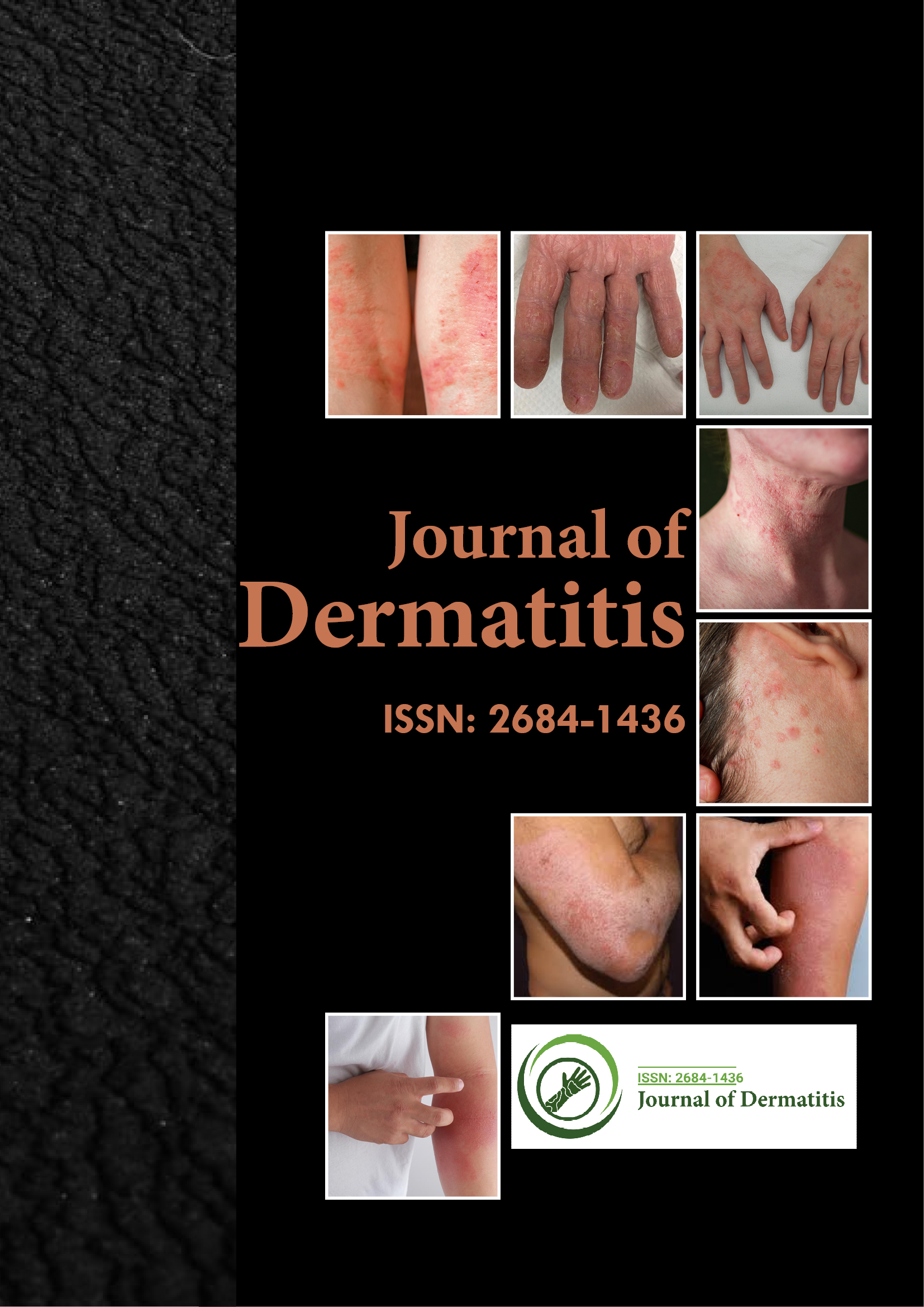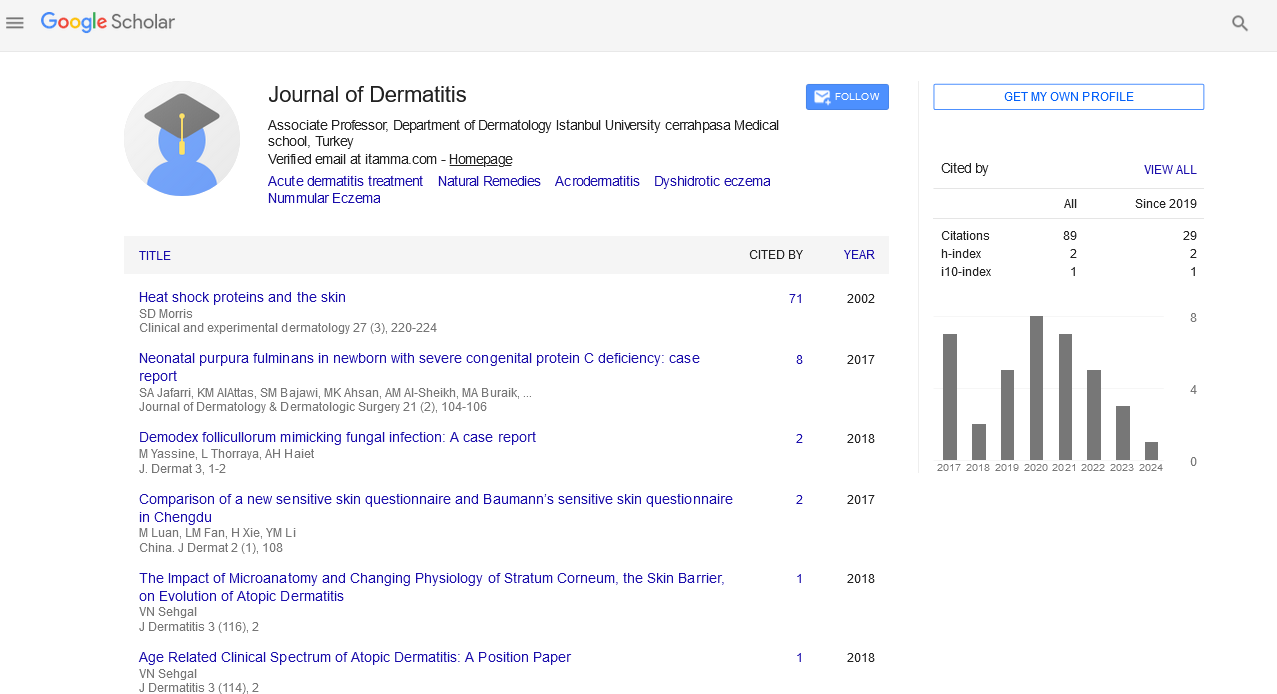Indexed In
- RefSeek
- Hamdard University
- EBSCO A-Z
- Euro Pub
- Google Scholar
Useful Links
Share This Page
Journal Flyer

Open Access Journals
- Agri and Aquaculture
- Biochemistry
- Bioinformatics & Systems Biology
- Business & Management
- Chemistry
- Clinical Sciences
- Engineering
- Food & Nutrition
- General Science
- Genetics & Molecular Biology
- Immunology & Microbiology
- Medical Sciences
- Neuroscience & Psychology
- Nursing & Health Care
- Pharmaceutical Sciences
Commentary - (2022) Volume 7, Issue 3
Treatment for the Lichen Planus and other Medication Factors
Bodnariuk Prashant*Received: 05-May-2022, Manuscript No. JOD-22-17070 ; Editor assigned: 09-May-2022, Pre QC No. JOD-22-17070 (PQ); Reviewed: 26-May-2022, QC No. JOD-22-17070 ; Revised: 01-Jun-2022, Manuscript No. JOD-22-17070 (R); Published: 07-Jun-2022, DOI: 10.35248/2329-6925.22.7.156
About the Study
Lichen planus is a skin rash triggered by the immune system. A variety of products and environmental agents can trigger this condition, but the exact cause isn’t always known. Sometimes this skin eruption is in reaction to a medication. When that’s the case, it’s called a lichenoid drug eruption, or drug-induced lichen planus. If the reaction occurs inside the mouth, it’s called oral lichenoid drug eruption. The rash can take some time to develop. Skin eruptions can range from mild to severe and cause itching and discomfort.
Causes
This type of skin disorder results from the skin epidermis being damaged, leading to interaction between the outer and inner layer. An allergic reaction occurs between the layers, which results in inflammation and purple discoloration of the skin. The exact cause has yet to be found, but skin specialists believe that the skin disorder is likely the result of a viral infection or an adverse response to drugs. It is common among the elderly who suffer from cardiovascular diseases and take medications to remedy high blood pressure.
A majority of medications used to treat arthritis, high blood pressure and heart disease tend to cause allergic reactions in the bodies of patients. This is also the case with proton pump inhibitors. The skin disorder is not contagious. It may point to a more severe skin condition and may be the result of graft-versushost skin disease or hepatitis C. Immediately seeking medical attention is imperative when this form of inflammation occurs so that medical professionals can make a diagnosis and quickly develop a treatment plan. There are numerous causes in which the skin disorder heals by its own within 24 months. It can, however, suddenly reoccur.
Treatment
Lichen planus on the skin often clears up on its own in months to years. If the disease affects the mucous membranes, it tends to be more resistant to treatment and prone to recur. Whatever treatment they may use, they need to visit the doctor for followup appointments about once a year.
Medications and other treatments might help relieve itching, ease pain and promote healing. Therapy can be challenging.
Corticosteroids
The first choice for treatment of lichen planus is usually a prescription corticosteroid cream or ointment. If that doesn't help and the condition is severe or widespread, the doctor might suggest a corticosteroid pill or injection. Common side effects of topical corticosteroids include skin irritation or thinning where the cream is applied and oral thrush. Corticosteroids are considered safe when taken as directed and for short-term use.
Oral anti-infections drugs
Other oral medicines used in selected situations for this condition are the antimalarial hydroxylchloroquine (Plaque nil and the antibiotic metronidazole.
Other medications
Many other medications may cause itchiness by damaging organs and body systems. This can happen when a medication is prescribed or used incorrectly. Medications with a risk of itchy skin include:
• Blood thinners
• Antimalarial medications
• Diabetes drugs
• Antibiotics
The thyroid is an important type of organ called a gland. This gland is located in the neck. It releases hormones that regulate the growth and metabolism. Having a thyroid disorder may cause itching without any rash. This is because the body’s cells, including those that make up the skin, stop working properly and dry out. Often, thyroid disorders are linked to the autoimmune condition Graves’ disease. For most people, taking antihistamines along with treatment for their thyroid issues can help relieve itching.
Citation: Prashant B (2022) Treatment for the Lichen Planus and other Medication Factors. J Dermatitis.7:156.
Copyright: © 2022 Prashant B. This is an open access article distributed under the terms of the Creative Commons Attribution License, which permits unrestricted use, distribution, and reproduction in any medium, provided the original author and source are credited.

